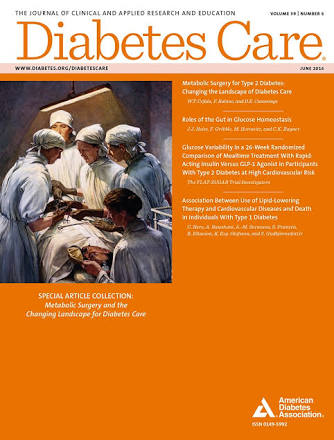Dr. Aparna Govil Bhasker
Bariatric Surgeon, Mumbai
“A picture speaks a thousand words”.
In February 2016, the cover page of Diabetes Care, one of the best international journals in the field of diabetes, carried a picture of a surgery being performed in the military hospital in the first world war. This was not only the first time, surgeons featured on the cover of a medical journal, but this entire issue was a special article collection dedicated to “metabolic surgery and the changing landscape of diabetes care”.
Quintessentially, diabetes has been a medical disease, traditionally treated with pills and injections. Metabolic surgery for the treatment of type 2 diabetes is a novel concept that has come to fore in the recent years. In 1978, Dr. Henry Buchwald from Minnesota, USA defined metabolic surgery as the operative manipulation of a normal organ or organ system to achieve a biological result for potential health gain [1]. Today, the term metabolic surgery is typically used to describe surgical procedures to treat type 2 diabetes and other components of metabolic syndrome.
Though the concept is not very new and has been around for about 30 years now, medical community has been very slow to warm up to the idea of metabolic surgery. Way back in 1995, Sir Walter Porries from USA, published a provocative paper – “Who would have thought it? An operation proves to be the most effective therapy for adult onset diabetes” [2]. In the same year-“metformin”, the wonder drug of diabetes treatment was discovered. While metformin went on to be the most commonly used drug in the diabetes spectrum, metabolic surgery still remains one of the most underutilized treatment option.
Lack of proper evidence has been cited as one of the reasons for the slow uptake of metabolic surgery. In addition to all the other evidence, in the recent years we have level 1 evidence in the form of eleven randomized controlled trials that have compared metabolic surgery with best medical management in overweight and obese patients. One hundred percent of these studies have shown that when it comes to over weight and obese patients, metabolic surgery is far superior in achieving glycaemic control [3]. In 2015, an Italian researcher compiled results of metabolic surgery in more than ninety thousand diabetic patients. In this study more than 71% diabetic patients achieved remission after metabolic surgery [4]. By remission, I mean that these patients had normal fasting blood glucose and HbA1c levels despite no medications for at least one year. Metabolic surgery has also been shown to lead to a significant improvement in high blood pressure and patients are six times more likely to reduce ≥ 30% of their blood pressure medications after surgery [5]. It is needless to say that metabolic surgery leads to an improvement in metabolic and inflammatory profile and decreases the long-term cardio-vascular risk in this patient population. With data and results available for almost one hundred thousand obese diabetic patients, I think it is time that we put the argument about lack of evidence to rest.
In 2015, a landmark meeting was held in London where 48 international scholars came together and formulated guidelines for metabolic surgery. It is important to note that out of 48, 75% of the voting delegates were non-surgeons. The voting panel mainly consisted of diabetologists, endocrinologists and physicians along with a few academic surgeons. These guidelines have been endorsed by 54 international societies across the world, many of which are diabetes societies. Diabetes India is one of them [6]. In 2017, the American Diabetes Association (ADA) accepted these guidelines as an integral part of management of type 2 diabetes [7].
The ADA guidelines for metabolic surgery are as under:
- Metabolic surgery should be recommended to treat type 2 diabetes in appropriate surgical candidates with BMI ≥ 40 kg/m2 (BMI ≥ 37.5 kg/m2 in Asian Americans), regardless of the level of glycemic control or complexity of glucose-lowering regimens, and in adults with BMI 35.0– 39.9 kg/m2 (32.5–37.4 kg/m2 in Asian Americans) when hyperglycemia is inadequately controlled despite lifestyle and optimal medical therapy.
- Metabolic surgery should be considered for adults with type 2 diabetes and BMI ≥ 30.0–34.9 kg/m2 (27.5–32.4 kg/m2 in Asian Americans) if hyperglycemia is inadequately controlled despite optimal medical control by either oral or injectable medications (including insulin).
The ADA also acknowledged that obesity management delays the progression of pre-diabetes to diabetes and is also beneficial in treatment of type 2 diabetes. They also said that modest weight loss reduces the need for glucose lowering agents.
Despite great results, presence of evidence and guidelines from the ADA, metabolic surgery is not even being performed for 1% of the eligible patient population who stand to benefit from this. I believe that the biggest reason for this is lack of awareness. People are still not aware about the potential benefits of this therapy. I agree that surgery comes with a risk of anaemia, calcium and vitamin deficiencies but these are preventable with a good follow up and team approach. The advent of laparoscopy has reduced the mortality rate by ten folds as compared to open surgery and the overall complication rate after a Roux-en y gastric bypass is about 3.4% which is about the same as that of a gall bladder or a knee surgery. It is up to us to choose the trade off between preventable nutritional deficiencies and a low complication rate after surgery with potential complications of remaining obese and diabetic in the long term. Given a choice I would rather have my patients on multi-vitamin, iron and calcium supplementation rather than being on insulin or in worse cases kidney transplants, angioplasties, amputations etc.
There is also a contention that even after metabolic surgery, the weight along with diabetes comes back after a few years. Approximately one-third of the patients do experience a relapse or recurrence after a median 8.3 years. I would say that this is not bad at all. 8.3 years of disease-free interval has the potential to yield significant long-term cardiovascular benefits. Metabolic surgery is not an absolute “cure” but it does buy the patient almost a decade of good quality of life and has the potential to push back the expected complications of diabetes.
In conclusion, metabolic surgery is a powerful tool for the treatment of obese diabetics. There is a substantial body of evidence that is showing that surgery on the GI tract yields better glycemic control in this patient population as compared to medical management alone. The role of gut in diabetes is being studied and is a hot topic across the world. Hopefully we shall have some tangible answers in the near future to explain the mechanisms behind diabetes remission after surgery. In the meanwhile, the medical community needs to break down walls and start building bridges so that the best possible therapy is advised to the patients. It is important to be cognizant of the burden that this burgeoning epidemic of diabesity is adding to our healthcare system. Diabetes and obesity are a deadly combination and although we cannot guarantee a cure, we can atleast endeavour towards getting a better glycemic control and quality of life. Metabolic surgeons and diabetologists/endocrinologists need to work in conjunction to provide the best treatment options to their patients.
Although it is true that ultimately it is He who heals, we as doctors must give our best to our patients.
References:
- Buchwald H. Metabolic surgery: a brief history and perspective. Surg Obes Relat Dis.2010 Mar 4;6(2):221-2.
- W J Pories, M S Swanson, K G MacDonald, S B Long, P G Morris, B M Brown, H A Barakat, R A deRamon, G Israel, J M Dolezal. Who would have thought it? An operation proves to be the most effective therapy for adult-onset diabetes mellitus. Ann Surg. 1995 Sep; 222(3): 339–352.
- Viktoria L Gloy et al. Bariatric surgery versus non-surgical treatment for obesity: a systematic review and meta-analysis of randomised controlled trials. BMJ 2013;347:f5934
- Panunzi S, De Gaetano A, Carnicelli A, Mingrone G (2015). Predictors of remission of diabetes mellitus in severely obese individuals undergoing bariatric surgery: do BMI or procedure choice matter? A meta-analysis. Ann Surg 261:459–467
- Schiavon CA, Bersch-Ferreira AC, Santucci EV et al. Effects of Bariatric Surgery in Obese Patients With Hypertension: The GATEWAY Randomized Trial (Gastric Bypass to Treat Obese Patients With Steady Hypertension). 2018 Mar 13;137(11):1132-1142.
- Rubino F, Nathan DM, Eckel RH et al. Metabolic Surgery in the Treatment Algorithm for Type 2 Diabetes: A Joint Statement by International Diabetes Organizations. Diabetes Care.2016 Jun;39(6):861-77.
- American Diabetes Association (2017) Obesity management for the treatment of type 2 diabetes. Diabetes Care 40:S57–S63






